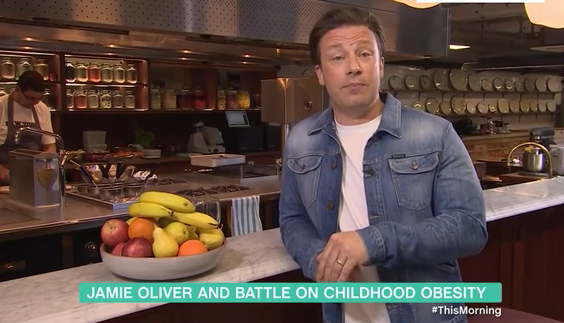Jamie Oliver Leads Fight On 'Breakthrough Day' To Tackle Childhood Obesity
updated on Apr 25, 2018

Campaigners are leading the fight to tackle childhood obesity, after Britain is revealed as having the highest levels in Western Europe
Research has shown around one in every five children aged 10 to 11 are obese, with a third of children aged two to 15 overweight or obese. This has prompted urgent calls for restricted advertising and increased powers to “keep junk food away from children.”
Jamie Oliver, who has fought tirelessly to rethink the way we think about children’s diets and school meals, has signed off a letter to Prime Minister Theresa May which has attracted signatures from leaders of Labour, the SNP, the Lib Dems and the Green Party.
The celebrity chef and healthy food campaigner has urged for healthier foods to be made cheaper, and easier to recognise. Mr Oliver believes this is placing a burden on the NHS and believes cross party support is a crucial hurdle that has been overcome.
Speaking on ITV’s This Morning, he said: “This is a breakthrough day today, very often when we are talking about protecting child health, politics is often in the way.”
“Today is a really interesting day with the letter because all of the opposition parties have agreed that they disagree on a lot of things, but not this. If there’s any conversation about a relevant strong and stable Britain, then you have to protect child health and be more productive and also be a happier and healthier country.”
'This is a breakthrough day', says @jamieoliver, as a group of politicians, campaigners and celebrities call for the Prime Minister to introduce 13 measures to tackle childhood obesity 👇 https://t.co/CuCjmF7su9
— This Morning (@thismorning) April 25, 2018
“It’s an amazing moment, it’s not one thing. It’s environmental changes where everybody has to do a bit to make a dramatic change.”
The 42 year-old raised 13 points in his letter, including to end junk food advertising before 9pm and for “fair and honest labelling”.
His calls come after a University of Otago study revealed raw fruit and vegetables may better support positive mental health than “cooked, canned or processed vegetables.”
Researchers sampled more than 400 young adults from New Zealand and the United States aged 18 to 25, picked as typically having the lowest fruit and vegetable consumption of all age groups and most at high risk for mental health disorders.
Dr Tamlin Conner, psychology senior lecturer and lead author of the study concluded: “This research is increasingly vital as lifestyle approaches such as dietary change may provide an accessible, safe, and adjuvant approach to improving mental health.”
The top 10 raw foods related to better mental health were: carrots, bananas, apples, dark leafy greens such as spinach, grapefruit, lettuce, citrus fruits, fresh berries, cucumber, and kiwifruit.
For more information on nutrition and further support, visit Nutritionist Resource.

